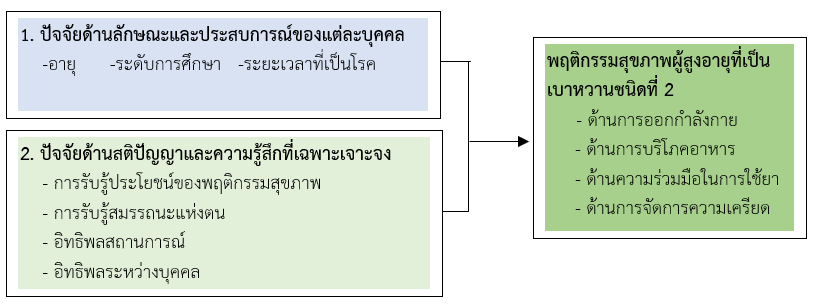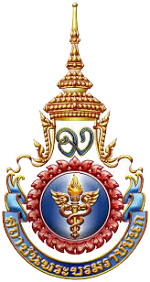ปัจจัยทำนายพฤติกรรมสุขภาพของผู้สูงอายุที่เป็นเบาหวานชนิดที่ 2 ที่ควบคุมระดับน้ำตาล ในเลือดไม่ได้ ตำบลหนองแวง อำเภอน้ำโสม จังหวัดอุดรธานี
คำสำคัญ:
พฤติกรรมสุขภาพ, เบาหวานชนิดที่ 2 ที่ควบคุมน้ำตาลไม่ได้, การรับรู้สมรรถนะแห่งตน, ผู้สูงอายุที่มีภาวะพึ่งพิงบทคัดย่อ
การวิจัยเชิงทำนายนี้มีวัตถุประสงค์เพื่อศึกษาพฤติกรรมสุขภาพ และปัจจัยทำนายพฤติกรรมสุขภาพของผู้สูงอายุที่เป็นเบาหวานชนิดที่ 2 ที่ควบคุมระดับน้ำตาลในเลือดไม่ได้ โดยใช้กรอบแนวคิดพฤติกรรมสุขภาพของเพนเดอร์ กลุ่มตัวอย่างเป็นผู้สูงอายุที่เป็นเบาหวานชนิดที่ 2 ที่ควบคุมไม่ได้ที่มารับการรักษาที่คลินิกเบาหวาน โรงพยาบาลส่งเสริมสุขภาพตำบล จำนวน 106 ราย ระหว่างเดือนกุมภาพันธ์ - เมษายน พ.ศ. 2565 คัดเลือกกลุ่มตัวอย่างแบบเฉพาะเจาะจง เครื่องมือที่ใช้เก็บรวบรวมข้อมูล ได้แก่ 1) แบบสอบถามข้อมูลส่วนบุคคล2) แบบสอบถามพฤติกรรมสุขภาพในผู้สูงอายุที่เป็นเบาหวานชนิดที่ 2 ที่ควบคุมระดับน้ำตาลไม่ได้ 3) แบบสอบถามการรับรู้ประโยชน์ของพฤติกรรมสุขภาพ 4) แบบสอบถามการรับรู้สมรรถนะแห่งตน
5) แบบสอบถามเกี่ยวกับอิทธิพล สถานการณ์ และ 6) แบบสอบถามเกี่ยวกับอิทธิพลระหว่างบุคคล วิเคราะห์ข้อมูลโดยใช้สถิติเชิงพรรณนา และการวิเคราะห์ถดถอยพหุคูณ
ผลการวิจัย พบว่า พฤติกรรมสุขภาพของผู้สูงอายุที่เป็นเบาหวานชนิดที่ 2 ที่ควบคุมระดับน้ำตาลในเลือดไม่ได้โดยรวมอยู่ในระดับปานกลาง เมื่อพิจารณาพฤติกรรมสุขภาพเป็นรายด้าน พบว่า พฤติกรรมสุขภาพด้านการบริโภคอาหาร พฤติกรรมสุขภาพด้านการออกกำลังกาย พฤติกรรมสุขภาพด้านการใช้ยา และพฤติกรรมสุขภาพด้านการจัดการความเครียด อยู่ในระดับเหมาะสมปานกลาง โดยการรับรู้สมรรถนะแห่งตน การรับรู้ประโยชน์ของพฤติกรรมสุขภาพ และอิทธิพลระหว่างบุคคล สามารถทำนายพฤติกรรมสุขภาพของผู้สูงอายุที่เป็นโรคเบาหวานชนิดที่ 2 ได้ร้อยละ 68.2 อย่างมีนัยสำคัญทางสถิติ (R2= .682, F= 18.923, p < .001) โดยการรับรู้สมรรถนะแห่งตนเป็นปัจจัยที่สามารถทำนายได้สูงสุด (β= .976, p < .001) ปัจจัยรองลงมาคือ การรับรู้ประโยชน์ของพฤติกรรมสุขภาพ (β= .532, p < .001) และอิทธิพลระหว่างบุคคล (β= .309, p < .001) ตามลำดับ
ดังนั้น พยาบาลเวชปฏิบัติผู้สูงอายุและบุคลากรทางการแพทย์ ควรให้ความสำคัญกับการส่งเสริมการรับรู้สมรรถนะแห่งตน การรับรู้ประโยชน์ของพฤติกรรมสุขภาพ และอิทธิพลระหว่างบุคคลของผู้สูงอายุที่เป็นเบาหวานชนิดที่ 2 เพื่อส่งเสริมพฤติกรรมสุขภาพในการควบคุมระดับน้ำตาลในเลือดแก่ผู้สูงอายุที่เป็นเบาหวาน
เอกสารอ้างอิง
Agency for Healthcare Research and Quality. (2020). Develop a Shared Care Plan. Retrieved April 11, 2022 from https://integrationacademy.ahrq.gov/products/playbook/ develop- shared-care-plan
Amattayakong, C., Oupra, R., & Kantawong, E. (2021). The Effectiveness of a Transformative Learning Program on Health Literacy Promotion among Older Adults with Diabetes. The Southern College Network Journal of Nursing and Public Health. 8(2), 232-245.
Bloom, B. S., Hastings, T. J., Madaus, G. F. (1971). Hand Book on Formative and Summative Evaluation of Student Learning. New York: McGraw – Hill Book Compaany Inc.
Bunwatana, J. (2019). Factors related to depression in persons with type 2 Diabetes. The Journal of Faculty of Nursing Burapha University. 17(2), 32-47.
Chaicharoen, K., Nabkasorn, C., & Vatanasin, D. (2018). The Effects of Supportive Group Psychotherapy on Self-esteem and Depression of Persons with Type 2 Diabetes. Journal of Phrapokklao Nursing College, Chanthaburi, 29(1), 1–16.
Charoenbundith, N. (2016). Factors related to health promoting behaviors among village health volunteers. A dissertation submitted in partial fulfillment of the requirement for the degree of nursing science faculty of graduate studies, Burapha University.
Cohen, J. (1988). Statistical power analysis of the behavioral scienes. New York : Lawrence Erlbaum. Diabetes Association of Thailand under The Patronage of Her Royal Highness Princess Maha Chakri Sirindhorn (DAT). (2023). Clinical Practice Guideline for Diabetes 2023. Nontaburi: Ministry of Public Health. (in Thai)
International Diabetes Federation. (2020). Cost-effective solutions for the prevention of type 2 diabetes. Retrieved April 15, 2022 from www.idf.org/preventiontype2diabetes
Phatiprajak S., Hanucharoenkul S., & Pia Sue N. (2014). Factors predicting self-care ability and quality of life with type 2 diabetes mellitus. Nursing Research and Innovation Journal, 20(1), 97–111.
Poonkla, S., & Aga, S. (2019). Factors Related to Self-Care Behavior of Diabetic Type II in Community. Journal of Boromarajonani College of Nursing, Surin. 9(1), 30-45.
Poonlapthawee, K. (1987). Statistics for research. Bangkok: Physics Center. Pradubmook, P., & Sringern-yuang, L. (2014). Life situation and life care of diabetes patients. Health system research journal, 2(4), 272-280.
Puawilai, A., & Bunsathien, W. (2010). Quality of life and factors related to it Quality of life of elderly women who have diabetes that does not depend on insulin. Nursing Research and Innovation Journal. 5(3), 255 -267.
Purwito, D., & Nuntaboot, K. (2010). Disease control through community involvement at the primary care services. Journal of Nursing and Health Care. 36(1), 181 -188.
Pender, N. J. (1996). Health promotion in nursing practice (3rd ed.). Stamford, Conn: Appleton and Lange.
Pender, N. J., Murdaugh, C. L., & Parsons, M. A. (2006). Health promotion in nursing practice (5th ed.). New Jersey: Pearson Education, Inc.
Saenpuang, S. (2010). Perception of benefits, perception of barriers, food consumption behavior among older persons with type 2 diabetes mellitus. A dissertation submitted in partial fulfillment of the requirement for the degree of nursing science faculty of graduate studies, Mahidol University. (in Thai)
Saithong, T. (2004). Relationships among situational influence, interpersonal influences, commitment to exercise and exercise behavior of exercise group members in Phang-nga province. A dissertation submitted in partial fulfillment of the requirement for the degree of nursing science faculty of graduate studies, Prince of Songkla University. (in Thai)
Suttaratanakul, S. (2017). Factors affecting self-management of patients with type 2 diabetes. A dissertation submitted in partial fulfillment of the requirement for the degree of nursing science faculty of graduate studies, Khon Kaen University. (in Thai)
Torkoksung, N. (2011). Factors influencing health promoting behaviors among village health volunteers in Khamthalesor, Nakhonratchasima Province. A dissertation submitted in partial fulfillment of the requirement for the degree of nursing science faculty of graduate studies, Thammasat University. (in Thai)
Wanlaoo, S., Malathum, P., & Siripitayakunkit, A. (2012). Family Support Perceived by Older Persons with Controlled Type 2 Diabetes. Rama Nurs J, 18(3), 372-388.
World Health Organization. (2020). Everybody’s business: Strengthening health systems to improve health outcomes. Retrieved April 16, 2022 from https://www.who.int/healthsystems/strategy/en/

ดาวน์โหลด
เผยแพร่แล้ว
รูปแบบการอ้างอิง
ฉบับ
ประเภทบทความ
สัญญาอนุญาต
ลิขสิทธิ์ (c) 2024 วิทยาลัยพยาบาลบรมราชชนนี นครศรีธรรมราช

อนุญาตภายใต้เงื่อนไข Creative Commons Attribution-NonCommercial-NoDerivatives 4.0 International License.
บทความที่ได้รับการตีพิมพ์เป็นลิขสิทธิ์ของ วิทยาลัยพยาบาลบรมราชชนนี นครศรีธรรมราช
ข้อความที่ปรากฏในบทความแต่ละเรื่องในวารสารวิชาการเล่มนี้เป็นความคิดเห็นส่วนตัวของผู้เขียนแต่ละท่านไม่เกี่ยวข้องกับวิทยาลัยพยาบาลบรมราชชนนี นครศรีธรรมราช และบุคคลากรท่านอื่น ๆ ในวิทยาลัยฯ แต่อย่างใด ความรับผิดชอบองค์ประกอบทั้งหมดของบทความแต่ละเรื่องเป็นของผู้เขียนแต่ละท่าน หากมีความผิดพลาดใดๆ ผู้เขียนแต่ละท่านจะรับผิดชอบบทความของตนเองแต่ผู้เดียว





